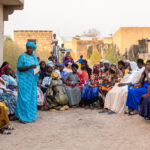The Girl Generation (TGG)-ALM hosted its fourth webinar on resourcing grassroots movements to end Female Genital Mutilation/Cutting (FGM/C), marking the beginning of the 16 Days of Activism Against Gender-Based Violence. Recognizing FGM/C as a significant form of gender-based violence with far-reaching consequences, the webinar highlighted the impact of the TGG-ALM grants mechanism in Kenya, Ethiopia, Somaliland, and Senegal.
Global and Regional Perspectives
Cheikh Tidiane Soce, Head of the Regional Inspectorate of Youth in Kolda, Senegal, emphasized the importance of centring women and girls in efforts to combat FGM/C. He noted that over 200 million girls worldwide, predominantly in Sub-Saharan Africa, are affected by the practice. Soce highlighted achievements such as cross-border collaborations, laws banning FGM, and increasing community engagement facilitated by TGG-ALM grants. He stressed the need for robust monitoring, evaluation, and learning systems to ensure sustainability and harmonization of efforts.
Grassroots Initiatives and Challenges
Huda Ahmed from Women Action for Advocacy & Progress Organization (WAAPO) shared challenges faced by women-led organizations in Somaliland, including gender biases in funding, limited donor priorities around FGM, and Somaliland’s lack of international recognition. Despite these barriers, WAAPO effectively uses TGG-ALM grants to focus on FGM prevention by amplifying the voices of survivors and young girls. Their programs prioritize leadership roles for girls, peer support sessions for adolescents, and creative campaigns to engage communities. Ahmed expressed optimism about Somaliland’s recently approved National Anti-FGM/C Policy, which strengthens legal frameworks and promotes coordinated action across sectors like health, education, and law enforcement.
Conflict-Adaptive Strategies in Ethiopia
Kidist Hailemariam Degebassa from Mahibere Hiwot for Social Development (MSD) in Ethiopia shared insights on implementing TGG-ALM initiatives in Amhara, a volatile region. MSD supports small and medium grassroots partners by enhancing leadership, project management, and advocacy skills. Conflict-adaptive strategies, such as employing local staff familiar with cultural contexts and community structures, have been instrumental in building trust and acceptance. MSD collaborates with government entities, religious institutions, and community leaders to drive behavioral change. A key outcome of their efforts is that 67 girls in the targeted areas refused to undergo FGM.
Grants Mechanism and Capacity Building
Caleb Okoyo, Grants Lead at Options, outlined TGG-ALM’s participatory grant selection process, which includes community involvement in prioritizing needs. The four-stage process encompasses scoping organizations, pre-award training, contracting, and implementation. Okoyo highlighted that the grants empower grassroots organizations to shift social attitudes, build capacity, and enhance leadership. Many grantees have strengthened their systems, enabling them to access funding from other stakeholders.
Abdikadir Hassan from Isiolo Human Rights Defenders (IHRD) noted the transformative impact of TGG-ALM capacity-building initiatives. IHRD progressed from small to medium grants after undergoing training in leadership, governance, financial management, and advocacy. By conducting community-level meetings rather than formal events in urban areas, IHRD successfully raised awareness and streamlined project implementation through transparent practices like MPESA payments. Hassan advised organizations to maintain transparency, adhere to government regulations, and prioritize community needs over personal interests.
Inclusivity and Grassroots Participation
Adjaratou BA, President of the Grants Advisory Committee (GAC) in Senegal, emphasized the inclusivity of TGG-ALM’s grants, which now benefit diverse groups, including youth, people with disabilities, and women. GAC members play key roles in monitoring and evaluating programs, ensuring effective coordination between beneficiaries and implementing partners. BA credited TGG-ALM for strengthening her leadership skills through capacity-building and coaching.
Reflections and Future Directions
Mohamed Silla, Executive Director of ActionAid Somaliland, acknowledged the ground-breaking approval of Somaliland’s Anti-FGM/C Policy after over a decade of advocacy. While this milestone reflects progress, Silla highlighted the need to engage religious leaders and communities in the eastern regions, where resistance persists. He praised TGG-ALM’s innovative grant approach, which ensures inclusivity and accountability through monitoring committees.
Jacinta Muteshi, TGG-ALM Team Lead, closed the webinar by celebrating the regional representation and insights shared. She commended grantees for strengthening their systems and positioning themselves to secure resources independently. The reflections gathered will further inform and improve the TGG-ALM grants program.
Conclusion
The webinar underscored the critical role of grassroots organizations in ending FGM/C, highlighting the tangible impacts of TGG-ALM grants in fostering capacity building, community engagement, and systemic change. By centering the voices of girls and survivors, addressing funding challenges, and implementing conflict-adaptive strategies, TGG-ALM demonstrates a sustainable approach to combating FGM/C across diverse contexts.


